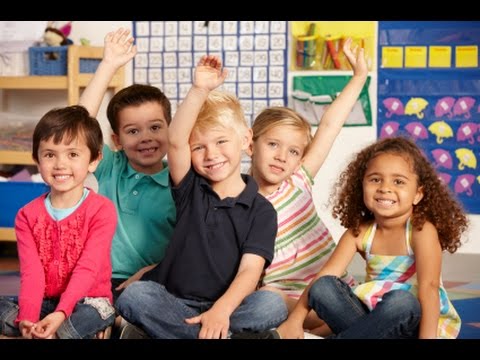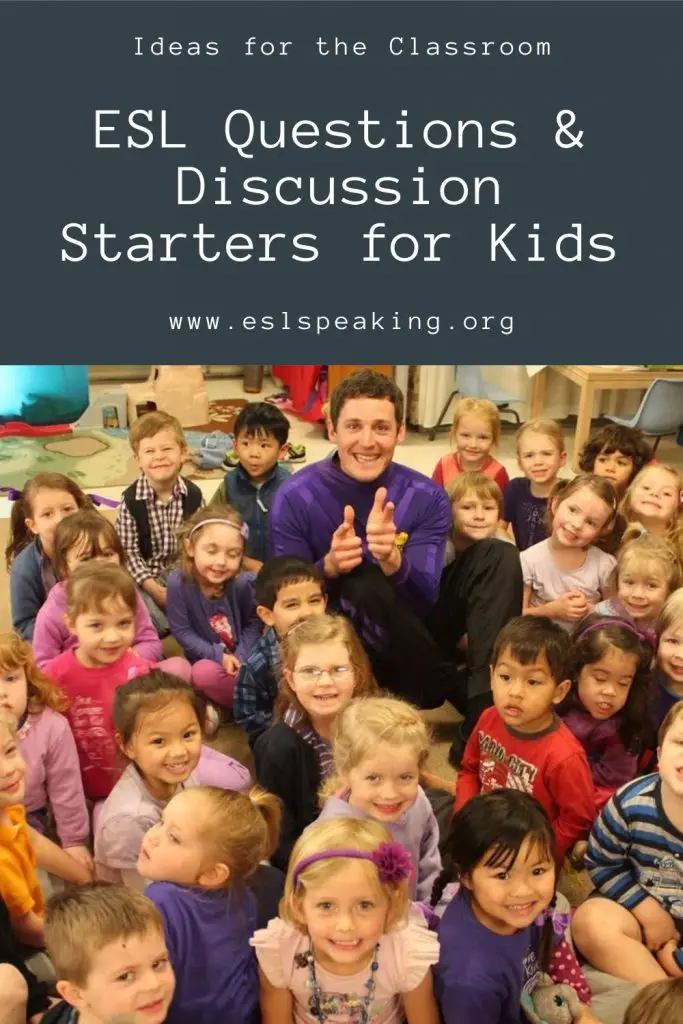If you’re looking for some things to talk about, consider these ESL topics for kids. We have the best TEFL discussion starters for children that will get your students talking, guaranteed.

ESL Discussion Starters for Kids
It’s common that native speaker English teachers have to teach “conversation classes.” This is not always easy to do with lower-level students, especially kids who might be a little bit shy.
I like to start off my classes with one of these interesting discussion starters for kids. Or, you can keep a few in your back pocket for those few minutes at the end of class when you’re done your lesson.
Keep on reading for all the information and TEFL discussion topics you need to make your classes with kids even better.
The Best Discussion Starters and ESL Questions for Kids
If you want some conversation starters for children, you’re in the right place. Use a favourite discussion starter to start your classes off in style.
Favorite Things
Have students fill in the blank with, “What’s your favorite _____?” Collect the papers, choose the best two or three and have then answer the questions.
Birthday Party
What would your perfect birthday party be? Money is no object.
Favorite and Least Favorite Meals
Something your parents cook that you love.
Something your parents cook that you hate.
Can you cook anything?
What’s your favourite food?
In your Bedroom
How is your bedroom decorated? Why did you choose each thing?
Ideal Vacation
What is the best vacation you can think of?
After School
What do you do after school usually? Is this what you want to do?
Super Power
If you could have one superpower, what would it be? Why?
$100
If you found $100 on the street, what would you do with it? (more ESL Money Activities here)
Favorite Thing and Person
What is your favorite thing?
Who is your favorite person?
Feelings
Do you ever feel angry?
Do you ever feel lonely?
When do you feel happy?
(More ESL Feeling Activities here)
Your House
Do you have a favourite spot in your house?
What are 3 words to describe your home?
Who do you live with at your house?
What room do you usually play in?
Family
Do you prefer spending time with a parent (mom or dad) or sibling (brother or sister)? Or, maybe a grandparent or aunt/uncle?
What are some things you like to do together?
Does your family eat dinner together most nights?
Does someone in your family have a very important job?
Do people listen to you when you talk?
School
What have you learned at school lately?
What’s your favourite subject? Why?
Who is your favourite teacher of all-time? Why are they your favourite?
Tips or Advice
Do you have any advice for kids entering into grade ___ at your school next year?
Books and Movies
What kind of books do you like to read?
What kind of movies do you like to watch?

ESL topics and questions for kids
How do I Use these Discussion Starters for Students?
That’s a good question and we’re happy that you asked! With adults, it’s pretty easy. You can just find a conversation topic that leads into whatever grammar or vocabulary point you’re teaching that day. Set up the question, put students into pairs or small groups and let them get to it.
However, kids are often less willing to just chit-chat with a partner about something. You may have to use more structure and make it more teacher-centred.
If you have a small class, then every student could share their answer. If you have a larger class, give each group 1-2 minutes to share their answers. Then, they could pick one student from each group to share their answer with the class.
Student-Generated Discussion Starters
One thing that I like to do at the beginning of a class is to get the students to come up with discussion starters. I give the class a few examples like the ones above. Then, I ask them what sorts of things they’re interested in talking about in our classes.
Each student has to write down 1-3 questions they’d like to discuss together over the semester. Then, gather up the papers and use it to make a master list of questions for each class. As you use them, cross that one off and make sure you go get at least one from each student.
Looking for a Discussion Starter for Adults?
If you’re looking for discussion starters for adults, then you’ll need to check this out. We have 10 of them to help you get your classes started off in style.
Conversation Starters for Adults
What are Some Good ESL Topics for Kids?
Looking for even more things that kids like to talk about in English class? Here are a few more ideas for ESL topics for children.
- Animals: Teach kids names of animals, their habitats, and their characteristics through fun activities and games.
- Colors: Introduce colors through interactive games, crafts, and stories.
- Family: Teach family members’ names and relationships, and have discussions about family dynamics.
- Food: Explore different types of food, snacks, and meals while learning vocabulary related to eating.
- Daily Routine: Discuss daily activities like waking up, getting ready for school, and going to bed, incorporating key verbs.
- Numbers and Counting: Teach numbers through counting games, puzzles, and interactive activities.
- Shapes: Introduce basic shapes through drawing, crafting, and shape recognition activities.
- Weather: Talk about different types of weather and related vocabulary, and engage in weather-related activities.
- Clothing: Learn about various types of clothing, their names, and when to wear them.
- Transportation: Explore different modes of transportation like cars, buses, and airplanes, and discuss travel experiences.
- Holidays and Celebrations: Discuss holidays like birthdays, Halloween, and Christmas, incorporating relevant vocabulary and traditions.
- School and Classroom Items: Teach names of objects in the classroom, school subjects, and school-related activities.
- Feelings and Emotions: Help kids express how they feel using words like happy, sad, excited, and scared.
- Toys and Games: Learn vocabulary related to toys, board games, and outdoor activities.
- Nature and Environment: Explore topics like plants, trees, seasons, and nature-related vocabulary.
- Fairy Tales and Story Characters: Introduce classic fairy tale characters and stories through interactive reading and creative activities.
- Body Parts: Teach kids names of body parts through songs, games, and activities.
- Sports: Explore different sports, their names, and basic rules through discussions and physical activities.
- Jobs and Professions: Introduce various jobs and careers through fun role-playing and discussions.
- My Home: Discuss rooms in a house, furniture, and items found at home.
Do you like these Conversation Starters for Kids?
- Amazon Kindle Edition
- Bolen, Jackie (Author)
- English (Publication Language)
- 92 Pages - 07/12/2015 (Publication Date)
Then you’re going to love this book: 39 No-Prep/Low-Prep ESL Speaking Activities: For Kids (7+). It’s lesson planning made easy, guaranteed.
You’ll be able to find a top-quality English speaking activity or game in no time. The key to interested, engaged students is to vary your lessons. 39 ESL Speaking Activities for Kids will help you do that easily.
Supplement the material in the textbook with some fun games and activities. Your students will appreciate it, and you’ll find that your classes are much more engaging.
You can find the book on Amazon in both print and digital formats. Keep a copy on your office bookshelf as a handy reference tool. Or, have a copy with you anywhere you go on your tablet or smartphone.
It really is that easy. Head on over to Amazon today to pick up your copy:
ESL Conversation for Kids FAQs
There are a number of common questions that people have about ESL questions and conversation topics for kids. Here are the answers to some of the most popular ones.
What do you talk about with ESL students?
You can talk about just about anything with ESL students. However, here are some of the most common topics:
- Hobbies
- Food
- How people spend their time
- Daily schedules
- School life
- Movies and TV
How do you make conversation with kids?
To make conversation with kids, follow these simple tips.
- Try to learn what the kids are into before seeing them.
- Don’t fact-check things they say, no matter how tempting!
- Be interested in what kids are interested in.
- Watch or do something together.
- Ask open-ended questions that don’t have a yes/no answer.
How can I teach English speaking to kids?
How can I get my child to speak English?
If you want to get your child to speak English more when it’s not their first language, here are a few things you do. First, don’t correct mistakes unless it’s impeding communication and only then, offer gentle correction. Always speak to the child in English whenever possible so that they get used to using it. Finally, offer some sort of incentive or reward for doing something like having an entire meal speaking English together.
What are some of the best topics to talk about with kids?
With kids, some of the best topics to talk about are the following: daily life things like what happened at school, friends, movies and TV, computer games, food, hobbies, daily schedules, and sports.

Conversation topic for kids
Have your Say: Favourite Discussion Starters for Children
What’s your favourite discussion starter for kids? Is it one from this list or do you have another recommendation? If you are looking for more questions like these, check out our 100 common English questions. Leave a comment below and share your thoughts with us. We’d love to hear from you.
Also be sure to give this article a share on Twitter, Pinterest, or Facebook. It’ll help busy English teachers, like yourself find this useful teaching resource.
Last update on 2025-06-27 / Affiliate links / Images from Amazon Product Advertising API






Excellent ideas. I use them by turning them into a board game – any basic board game will do – draw one up yourself, make it look like a snail for fun. Either write a topic on each square, or use cards with topics on them. For beginners, maybe say they need to say two sentences. For more advanced, can they talk about the topic for 30 seconds.. or 2 minutes, depending on standard of English and time available.
Great ideas for discussion topics for kids. I love to have a bit of banter back and forth at the start of my classes and these are certainly some good ideas.